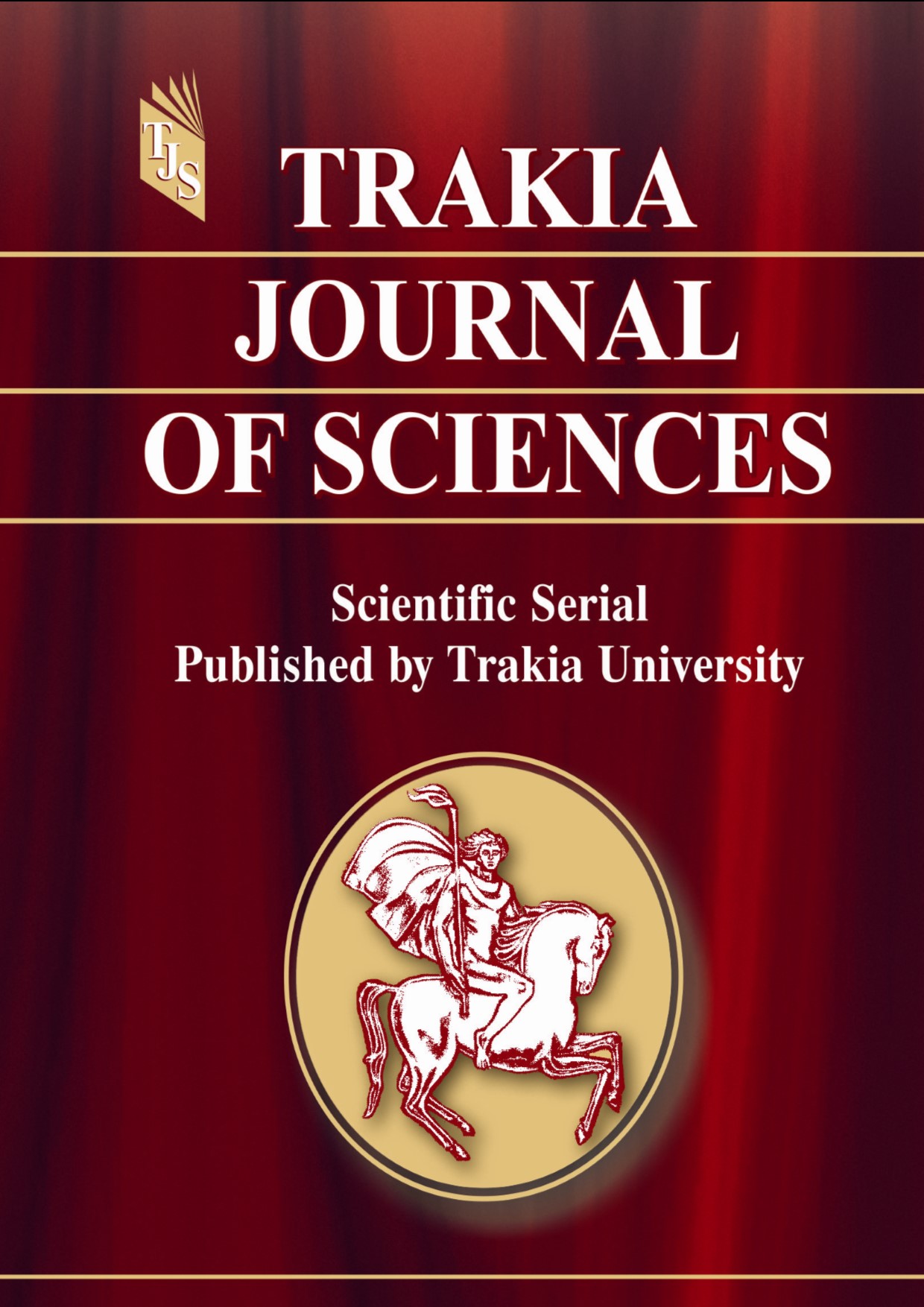PECULIARITIES OF PHYSICAL SELF-CONCEPT AND PSYCHIC WELL-BEING OF FIFTH TO TWELFTH-GRADERS
DOI:
https://doi.org/10.15547/tjs.2024.s.01.019Keywords:
global physical self-esteem, health, overweight, coordination, appearanceAbstract
Building on numerous studies that have established the positive influence of physical activities on physical and mental health, this study AIMED to specifically investigate the influence, interrelations, and dynamics between Physical Self-Concept and the Well-being of fifth to twelfth-graders. The research was done among 46 pupils—23 girls and 23 boys—between the ages of 11 and 17, divided into groups according to their gender and age: 11-14-year-olds (24 pupils) and 15-17-year-olds (22 pupils). The pupils study at the Private Secondary School Roerich, where they extensively study foreign languages and art. METHODS: The research methods included a Bulgarian adaptation of the Physical Self-Description Questionnaire (PSDQ-S), which measures Physical Self-concept through scales measuring nine specific and two general components: global physical self-esteem and global self-esteem and a Well-being Index. RESULTS: Both tests of the Physical self-concept show that the main components are health and being overweight. We found statistically significant differences regarding the age in the second test related to appearance (U=174,000; p=0.05). The older pupils had higher results (М=3.83; SD= 1.53) than the younger ones (М=3.08; SD= 1.51). The data from the regression analysis showed that in the first testing, the high level of coordination (β=0.434) and the general physical self-concept (β=0.342) positively influenced well-being. In the second test, the coordination increased (β=0.656), while overweight (β=-0.319) negatively influenced the pupils' well-being. CONCLUSION: The results from this study may facilitate our understanding of the role of pupils' physical self-concept in their well-being.
References
Martín-Rodríguez, A.; Gostian-Ropotin, L.A.; BeltránVelasco, A.I.; Belando-Pedreño, N.; Simón, J.A.; López-Mora, C.; Navarro-Jiménez, E.; TorneroAguilera, J.F.; Clemente-Suárez, V.J. Sporting Mind: The Interplay of Physical Activity and Psychological Health. Sports, 12, 37, 2024
Wicker P, Frick B. Intensity of physical activity and subjective well-being: an empirical analysis of the WHO recommendations. J Public Health (Oxf). Jun 1; 39 (2) p.19-26, 2017
Downward, P., & Rasciute, S. Does sport make you happy? An analysis of the well‐being derived from sports participation. International Review of Applied Economics, 25(3), p. 331–348, 2011
Rosenberg, M. Conceiving the Self. Melbourne, FL: Krieger, 1987
Harter, S. The Determinants and Mediational Role of Global Self Worth in Children. In: Eisenberg, N., Ed., Contemporary Topics in Reply to: Developmental Psychology, John Wiley, New York, p. 219-242, 1987
Earl, S. R. Global and appearance-contingent self-esteem: Associations with health and attractiveness exercise reasons. Psychology of sport and exercise. Mar; 65:102345, 2023
Wylie, R. C. Measures of Self-Concept. Lincoln: University of Nebraska, 1989
Väänänen, J., Isomaa, R., Kaltiala-Heino, R., Fröjd, S., Helminen, M., Marttunen, M. Decrease in self-esteem mediates the association between symptoms of social phobia and depression in middle adolescence in a sex-specific manner: a 2-year follow-up of a prospective population cohort study. BMC Psychiatry 14:79, 2014
Zeigler-Hill, V. The importance of self-esteem. In V. Zeigler-Hill (Ed.), Self-esteem (pp. 1–20). Psychology Press, 2013
Stets, J., Burke, P. The development of identity theory. Advances in group processes 31, p.57-97, 2014
Jordan, C. H., & Zeigler-Hill, V. Fragile self-esteem: The perils and pitfalls of (some) high self-esteem. In V. Zeigler-Hill (Ed.), Self-esteem (p. 80–98). Psychology Press, 2013
Dhanabhakyam, M., & Sarath, M. (2023). Psychological Wellbeing: Asystematic Literature Review. International Journal of Advanced Research in Science, Communication and Technology, p.603–607, 2023
Deci, E. L., & Ryan, R. M., Hedonia, eudaimonia, and well-being: An introduction. Journal of Happiness Studies: An Interdisciplinary Forum on Subjective Well-Being, 9 (1), p.1–11, 2008
Ruggeri, K., Garcia-Garzon, E., Maguire, Á. et al. Well-being is more than happiness and life satisfaction: a multidimensional analysis of 21 countries. Health Qual Life Outcomes 18, 192, 2020.
Huppert FA. Psychological well-being: evidence regarding its causes and consequences†. Appl Psychol Health Well Being, 1(2) p.137–64, 2009
World Health Organization. The world health report 2001: mental health: new understanding, new hope. Geneva: World Health Organization; 2001
Marsh, H. W., Martin, A. J., & Jackson, S. Introducing a short version of the Physical Self Description Questionnaire: New strategies, short-form evaluative criteria, and applications of factor analyses. Journal of Sport & Exercise Psychology, 32(4), p.438–482, 2010
Domuschieva-Rogleva, Approbation of the Physical Self-Description Questionnaire (PSDQ-S) in Bulgarian conditions. In: Personality, motivation, sports. (Aprobatsiya na testa za samootsenka na vŭnshniya vid (Physical Self-Description Questionnaire – PSDQ-S) v bŭlgarski usloviya. V: Lichnost, motivatsiya, sport - in Bulgarian) 21, p. 32-40, 2017

Downloads
Published
Issue
Section
License
Copyright (c) 2025 Trakia University

This work is licensed under a Creative Commons Attribution-NonCommercial 4.0 International License.


